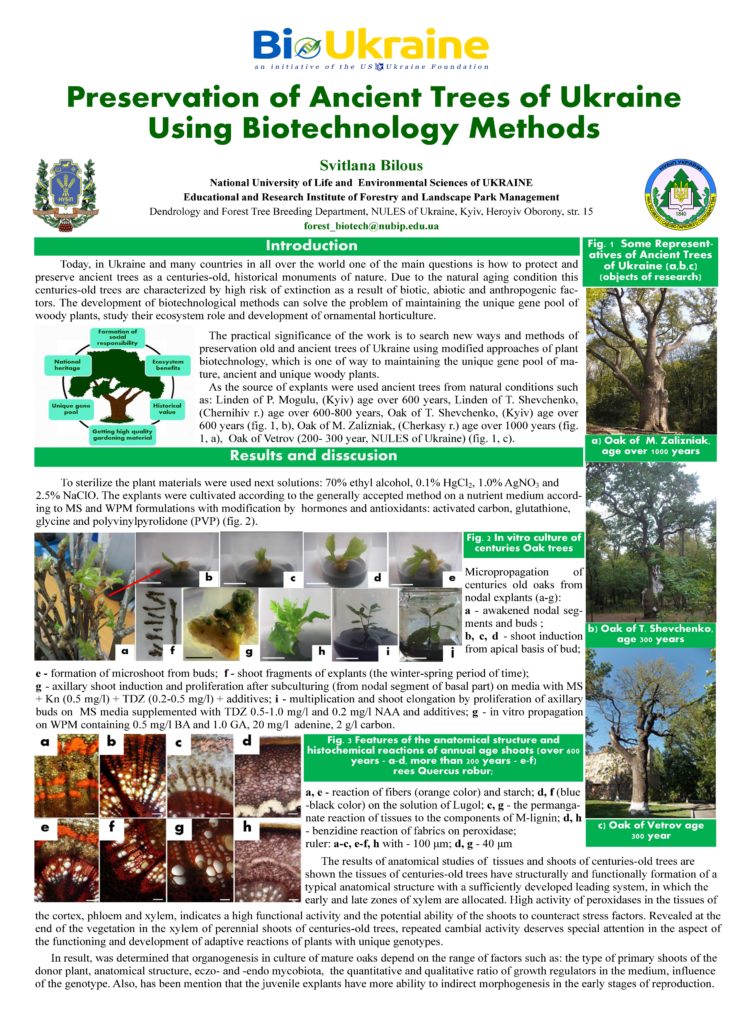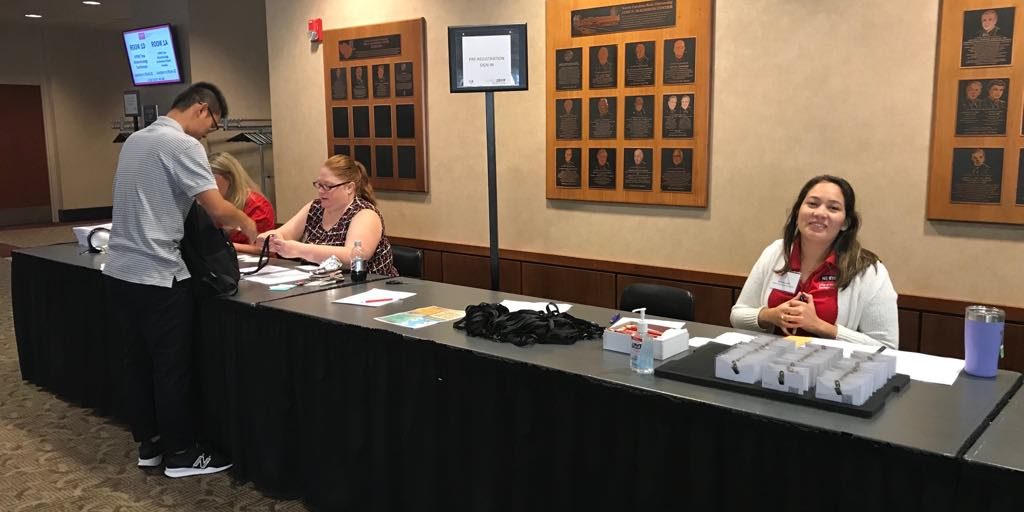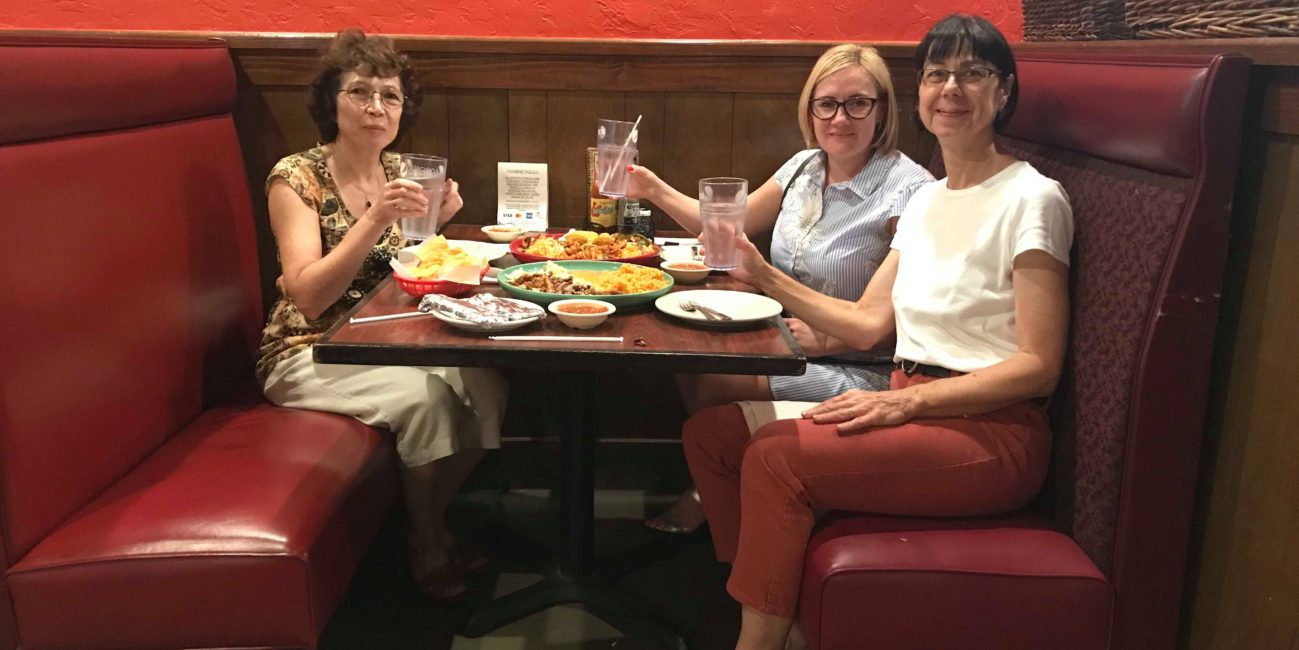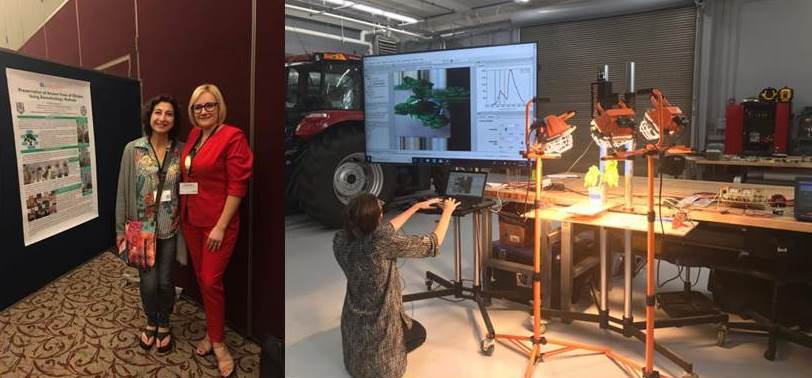The population of the planet is increasing, people are using more and more wood products and a large number of other ecosystem services. Preserving the same biosphere requires conservation of natural forests. In such conditions, forestry should become high-tech and one of the key scientific instruments is biotechnology. It is for the development of forest biotechnology that the International Union of Forest Research Organizations (IUFRO) holds the Tree Biotechnology Meeting every two years.
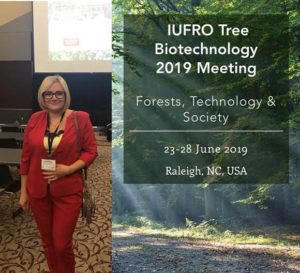 Svitlana Bilous, a recipient of a travel grant through the US-Ukraine Foundation Biotech Initiative Emerging Biotech Leaders awards program, participated in the IUFRO Tree Biotechnology 2019 Meeting hosted by North Carolina State University.
Svitlana Bilous, a recipient of a travel grant through the US-Ukraine Foundation Biotech Initiative Emerging Biotech Leaders awards program, participated in the IUFRO Tree Biotechnology 2019 Meeting hosted by North Carolina State University.
The 2019 IUFRO Tree Biotechnology Conference is the biennial meeting on genomics, molecular biology and biotechnology of forest trees, associate with the IUFRO Working Party 2.04.06 (Molecular Biology of Forest Trees). This year’s meeting “Forests, Technology and Society” was held in Raleigh, NC, USA on June 23- 28 and was hosted by Drs Ross Whetten (North Carolina State University) and Zander Myburg (University of Pretoria). In addition to a robust scientific program, the meeting celebrated the career of Dr. Ron Sederoff, recipient of the Marcus Wallenberg Foundation Prize. A number of leading scientist from outside the community were also invited to provide insights into new and developing fields of plant biotechnology
The meeting presented modern and new applications in forest biotechnology, as well as illustrated uses of CRISPR magic: the functions and applications of Cas based molecular machines in forest trees and other fields of research, network analysis for understanding complex biological processes, and genomic selection for the improvement and to accelerate the breeding and selection of forest trees.
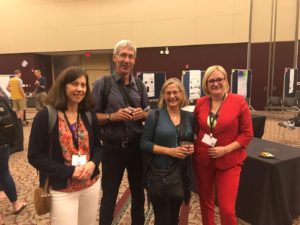 The conference covered eight topics over the course of five days: 1) Genome structure, function and evolution, 2) Big data in tree genomics and phenomics, 3) Transgenic technologies, genome editing, and in vitro culture, 4) Societal acceptance of tree biotechnology, 5) Genes, development and physiology, 6) Tree responses to climate change, 7) Tree populations, genetics, diversity and breeding, and 8) Biotechnology for biomaterials and bioeconomy. In addition to the sessions, there was a Diversity and Inclusion Breakfast addressing the participation of underrepresented groups.
The conference covered eight topics over the course of five days: 1) Genome structure, function and evolution, 2) Big data in tree genomics and phenomics, 3) Transgenic technologies, genome editing, and in vitro culture, 4) Societal acceptance of tree biotechnology, 5) Genes, development and physiology, 6) Tree responses to climate change, 7) Tree populations, genetics, diversity and breeding, and 8) Biotechnology for biomaterials and bioeconomy. In addition to the sessions, there was a Diversity and Inclusion Breakfast addressing the participation of underrepresented groups.
The challenges facing the forest industry in the 21st century due to rapid climate change and the increase in the incidence of various violations in forest ecosystems can not be solved without the development and introduction of modern biotechnologies for sustainable plantings and plantations, as well as the preservation of a unique gene pool.
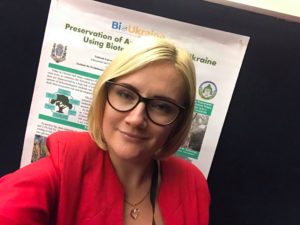 Svitlana Bilous presented on scientific developments in biotechnology for the propagation of tree plants, including centuries-old trees. She discussed detailed results of her research and possible areas of scientific cooperation during the poster session.
Svitlana Bilous presented on scientific developments in biotechnology for the propagation of tree plants, including centuries-old trees. She discussed detailed results of her research and possible areas of scientific cooperation during the poster session.
The scientific presentations at the conference highlighted cutting-edge advancements in many facets of forest biotechnology research, including applications of genomic selection in forest genetics and breeding, tree physiology, stress response, molecular breeding, wood development, “omics” technologies, and the social and economic impacts of genetically modified trees. Scientific take homes from the meeting include the rise in phenotyping as more and more genotyping data becomes available; the advent of collaborative metadata analyses and integration of systems biology with climate and geographical data; and the challenges of genome editing with the understanding of the infinitesimal effect of alleles. Other take homes include the importance of including local indigenous groups in the conversations around forest molecular biology, improving conversations around biotechnology with the public and increasing measures of diversity in the scientific community.
The conference attracted a mix of students, postdoctoral fellows, and scientists from academia and industry. In all, the conference was attended by 160 registered participants, representing 21 countries that participated in 28 invited lectures (including 8 ‘early-career’ keynotes), 28 voluntary talks and over 70 poster presentations with 30 associated lightning talks. Support for the conference was drawn from a wide variety of Academia, Industry, and Government sources, and included financial support from several commercial genomic service providers.
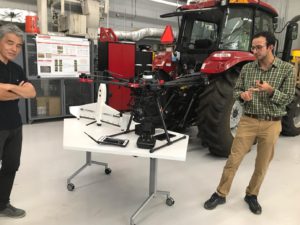 The conference program provided a guided tour and interactive session to Suggs Laboratory for Precision Agriculture and Machine Systems, a 3,000 sq. ft. facility housed within the Department of Biological and Agricultural Engineering (BAE) at NC State. The session was highlighted by several technologies being used by the faculty within the BAE department for high-throughput phenotyping and precision agriculture applications. The following technologies and their potential use in forestry applications were discussed: hyperspectral imaging of 400 wavelengths, LiDAR technology for obtaining point clouds and 3D measurements, and computer vision approaches using visible and NIR imaging. Several platforms that can be utilized for data collection, including unmanned aerial and ground-based systems, were also highlighted.
The conference program provided a guided tour and interactive session to Suggs Laboratory for Precision Agriculture and Machine Systems, a 3,000 sq. ft. facility housed within the Department of Biological and Agricultural Engineering (BAE) at NC State. The session was highlighted by several technologies being used by the faculty within the BAE department for high-throughput phenotyping and precision agriculture applications. The following technologies and their potential use in forestry applications were discussed: hyperspectral imaging of 400 wavelengths, LiDAR technology for obtaining point clouds and 3D measurements, and computer vision approaches using visible and NIR imaging. Several platforms that can be utilized for data collection, including unmanned aerial and ground-based systems, were also highlighted.
Overall, the conference was a great success, providing an exceptional mix of science, social activities and field excursions in a relaxed and collegial atmosphere. More information about the meeting can be found at https://www.treebiotech2019.org/.
The next meeting will be held in Harbin, China in 2021, and will be hosted by Dr. Vincent Chiang and his colleagues at the Northeast Forestry University.
-Svitlana Bilous
Svitlana Bilous is an Associate Professor in the Botany, Dendrology and Forest Tree Breeding Department, National University of Life and Environmental Sciences of Ukraine, Kyiv, Ukraine. In 2018 she was one of 24 young scientists recognized by the US-Ukraine Foundation Biotech Initiative Emerging Biotech Leaders Awards program.
CONFERENCE POSTER
